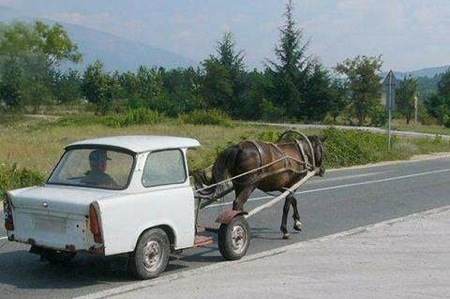Project Park Day 7 - The Personal Cost of Driving

The past couple of days, being the weekend, have been pretty easy on our one-car family. We drove together as we usually would to our usual errands and weekend outings. I did take the car out by myself on Saturday, while Stephanie was doing a little painting and Miles was asleep. I’m in the habit of “getting away” when I can on the weekends, when I have nothing better to do and driving to the bookstore or the coffee shop seems like a fun idea.
Today I took some time to try and plan out the next few days (I’ve learned my lesson, see?). As I thought about what I might need to do today, that I wouldn’t be able to do tomorrow, nothing came to mind. I asked myself if I really needed to go spend money at the book store or coffee shop, and the answer was no. So I grabbed a good book and a beer, and stayed home. I don’t need to tell you that it was a nice afternoon.
How Much Does Driving Cost?
Yesterday I got out a yellow pad and jotted down some quick and dirty numbers, to get an idea of how much I pay each month for the privilege of owning and (over?)using a car. I added up taxes, inspection, registration, gas, depreciation, maintenance, and repair costs. After wondering about the accuracy of this, however, I decided to see if I could do better.
The world is full of estimates of the “cost of ownership” of a car. The “True Cost of Driving” calculator at commutesolutions.org, for example, goes for the kitchen sink approach. Figuring in such indirect “costs” as “transportation equity and diversity” (0.7 cents per mile), it gave me a figure of $1413 per month. Using AAA’s more basic estimates, I calculated my costs at somewhere between $562 and $731. The numbers seem to be all over the place.
It turns out, for me anyway, that nailing down a reasonably accurate figure for my true cost of driving is difficult, regardless of my approach. There are just too many hard choices to make. Do I include sketchy costs in my calculations, like the cost of lost work due to an accident, multiplied by the odds of having said accident? And if so, what numbers do I use? And how accurate would those numbers be? And what price do you put on the stress–of driving an undependable car, of the contemptuous lip curl that appears on my face as soon as I get on the road, of the stop-and-go traffic? Once you start adding and multiplying fuzzy numbers together, the fuzziness compounds on itself until you are, in all likelihood, left with little more than a blind guess.
So I decided that maybe I can’t do much better than the back-of-the-napkin sketch I started out with. Which, for me and my paid-for but ailing Subaru Outback, came out to about $420 per month. By comparison, a 31-day Triangle bus pass costs $68 (fuzz-free!), which includes unlimited transportation on all of the area’s four major bus services.
(Note that my figures, like AAA’s figures, do not figure in “external costs”; they simply try to find how much cash my car is costing me every month. External costs (also known as indirect costs) like the cost of oil spills, noise pollution, and interstate land, are also difficult numbers to calculate. More to the point, each one of these kinds of costs could take a few thousand words just to skim over. And I have to go to bed some time tonight. To give some basis for comparison, though: according to a study cited in “Divorce Your Car!” by Katie Alvord, every dollar spent on operating costs imposes $2.70 in external costs.)
With these figures in mind, the big question in this economic exploration may be: what is the value to me and my family (or you and yours, or anyone) of having that extra car in the driveway? And what is the value of the alternative?
Or maybe the big question is: How much fuzziness can you take?
Resource of the Day:
gotriangle.org. A centralized resource for information on commuting and transit in the Triangle, including bus maps and schedules for all major area transit lines, tools for ridesharing and the free “Emergency Ride Home” program, and even a set of resources for commuter planning and advocacy.
Quote of the Day:
Bicyclists are not licensed. Bicycles have no fees, no registration attached to them. I think they should be a little more considerate of the people that are driving.”
N.C. Representative Nelson Cole (D – Rockingham Co.), discussing his proposed legislation that would require cyclists to ride no more than two abreast, and ride single file when an automobile approaches.
[Update: In 2015 The Atlantic published The True Costs of Driving, solidly debunking the old myth that drivers pay for the roads they use through fees and taxes.]